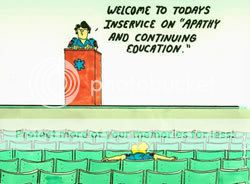Another one feels my frustration.
Unfortunately, it appears very few EMT's are taught about anything on EMS systems and their profession. We push through the basics of what protocols are, basic system development, and the use of common sense. Rather, we have now manufactured robots with assurance of saying mnemonics of BSI, scene safe (even on the granny fall), 02 NRBM, puls ox, and DCAP.. PQRST...EIOU. Only for them not to truly understand the "whole picture". Unfortunately, EMS instructors are not taught to teach critical thinking skills.
Rules and protocols are
guidelines that can be amended and changed. Does your EMT's and medics get involved with protocol development ? Do you and others EMT's/medics have a good working relationship with your medical director and discuss patient care ?
I was reading an article in an
Emergency Nursing Journal titled
If You're Not Outraged, You're Not Paying Attention. Which I thought was a ironic title that could be used in EMS.
I used to believe the number one problem in EMS was lack of education, but after reading EMS forums and working with even the best at heart I have found apathy to be the biggest of our concern. Many fail to look past the basic texts as being the "bible" in EMS. What many do not realize EMT books takes about seven years to be published and most material is our of date by publication. This is one of the difficulties in education. One has to keep abreast of continuous growth and expenditure.
It is your job.. (paid or not), the system is made of you!. Not, participating in changes, or reforms is the worst one can do for the profession and in the long run for their patients.
R/r 911


